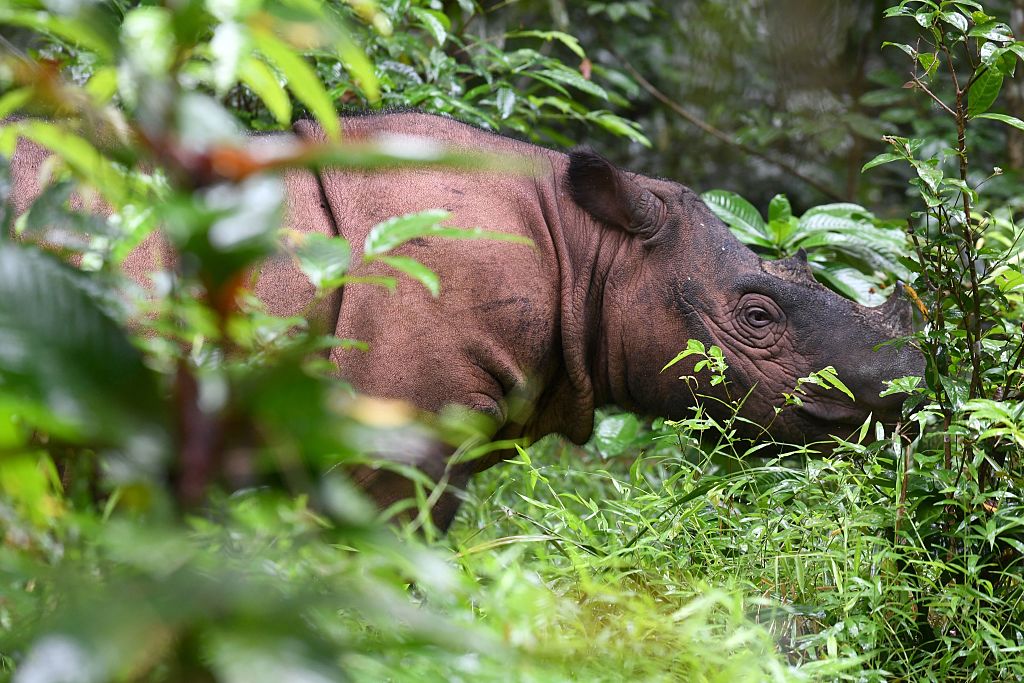Researchers warn more than 500 land animal species could go extinct within 20 years


A free daily email with the biggest news stories of the day – and the best features from TheWeek.com
You are now subscribed
Your newsletter sign-up was successful
Researchers warn that more than 500 species of land animals — including the Sumatran rhino and the Española tortoise — are on the brink of extinction and will likely be lost within two decades, The Guardian reports. Land vertebrates with fewer than 1,000 individuals left were considered at risk of dying out in the near future in the new analysis published in the journal Proceedings of National Academy of Scientists.
The researchers also said because 84 percent of those species lived in the same regions their demise could create a domino effect. For example, per The Guardian, overhunting of sea otters led to the extinction of of the Steller's sea cow in the 1700s because otters were the main predator of kelp-eating sea urchings. When left unchecked, the sea urchins devastated the kelp forests upon which the sea cows grazed. "Extinctions breed extinctions," the researchers said.
Of course, a decline in biodiversity will have adverse effects for humans, as well. "When humanity exterminates other creatures, it is sawing off the limb on which it is sitting, destroying working parts of our own life-support system," said Stanford University's Paul Ehrlich, one of the researchers. "The conservation of endangered species should be elevated to a global emergency for governments and institutions, equal to the climate disruption to which it is linked."
The Week
Escape your echo chamber. Get the facts behind the news, plus analysis from multiple perspectives.

Sign up for The Week's Free Newsletters
From our morning news briefing to a weekly Good News Newsletter, get the best of The Week delivered directly to your inbox.
From our morning news briefing to a weekly Good News Newsletter, get the best of The Week delivered directly to your inbox.
University College London's Georgina Mace said she wasn't convinced that simply having fewer than 1,000 individuals was the best way to measure a species' extinction risk — a declining trend for the population is crucial, too — but, nevertheless, she believes the study "re-emphasizes some startling facts" and that "action is important for many reasons." Read more at The Guardian.
A free daily email with the biggest news stories of the day – and the best features from TheWeek.com
Tim is a staff writer at The Week and has contributed to Bedford and Bowery and The New York Transatlantic. He is a graduate of Occidental College and NYU's journalism school. Tim enjoys writing about baseball, Europe, and extinct megafauna. He lives in New York City.
-
 6 exquisite homes with vast acreage
6 exquisite homes with vast acreageFeature Featuring an off-the-grid contemporary home in New Mexico and lakefront farmhouse in Massachusetts
-
 Film reviews: ‘Wuthering Heights,’ ‘Good Luck, Have Fun, Don’t Die,’ and ‘Sirat’
Film reviews: ‘Wuthering Heights,’ ‘Good Luck, Have Fun, Don’t Die,’ and ‘Sirat’Feature An inconvenient love torments a would-be couple, a gonzo time traveler seeks to save humanity from AI, and a father’s desperate search goes deeply sideways
-
 Political cartoons for February 16
Political cartoons for February 16Cartoons Monday’s political cartoons include President's Day, a valentine from the Epstein files, and more
-
 Nobody seems surprised Wagner's Prigozhin died under suspicious circumstances
Nobody seems surprised Wagner's Prigozhin died under suspicious circumstancesSpeed Read
-
 Western mountain climbers allegedly left Pakistani porter to die on K2
Western mountain climbers allegedly left Pakistani porter to die on K2Speed Read
-
 'Circular saw blades' divide controversial Rio Grande buoys installed by Texas governor
'Circular saw blades' divide controversial Rio Grande buoys installed by Texas governorSpeed Read
-
 Los Angeles city workers stage 1-day walkout over labor conditions
Los Angeles city workers stage 1-day walkout over labor conditionsSpeed Read
-
 Mega Millions jackpot climbs to an estimated $1.55 billion
Mega Millions jackpot climbs to an estimated $1.55 billionSpeed Read
-
 Bangladesh dealing with worst dengue fever outbreak on record
Bangladesh dealing with worst dengue fever outbreak on recordSpeed Read
-
 Glacial outburst flooding in Juneau destroys homes
Glacial outburst flooding in Juneau destroys homesSpeed Read
-
 Scotland seeking 'monster hunters' to search for fabled Loch Ness creature
Scotland seeking 'monster hunters' to search for fabled Loch Ness creatureSpeed Read
